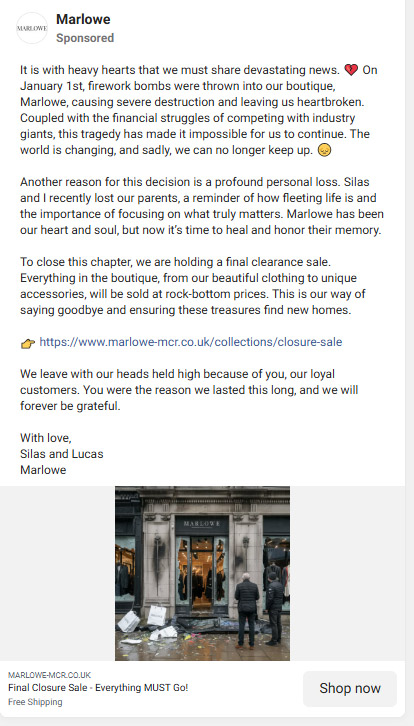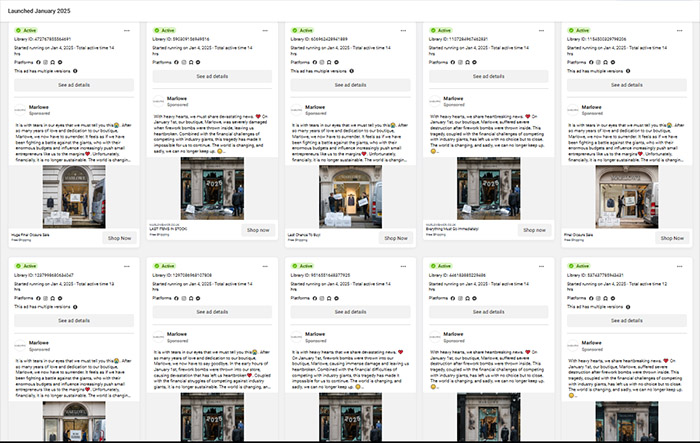Fake ‘clearance sale’ scams still Prevalent on Facebook Sponsored Ads
We often check in on the social media behemoths to see how they’re getting on with ridding their respective sponsored advertising platforms of scammers trying to force-feed their illegal wares onto unsuspecting users.
More often than not, what we find is disappointing. And it seems that 2025 is going to be “par for the course” when it comes to Meta’s dismal track record of fighting cyber crooks.
It didn’t take very long for the first scammy sponsored advert of 2025 to appear on our Facebook newsfeed. We’ve taken the liberty of screenshotting it below. From all appearances, a clearance sale from a fashion outlet called Marlowe, posted by its two owners – Lucas and Silas – who are selling their online products at rock bottom prices after their brick-and-mortar store was targeted by firework bombs and the defeated pair decided it was no longer worth trading.

A compelling story on the surface, tapping into the frustration of a public angry at rising prices and smaller brands being pushed out by retail goliaths. But the story is as fake as the AI generated thumbnail image of the firework-damaged store. There is no Marlowe (well actually there are, including a high-end Italian cashmere brand, but none in any way connected to the Marlowe in this sponsored advert) and the link leads to a URL called marlowe-mcr.co.uk, a domain that didn’t exist up until a dozen or so days ago.
Sponsored Content. Continued below…
Similarly, the ‘Marlowe’ Facebook page was only created a month ago, and a simple query of what other sponsored adverts the page was running soon revealed the depressing reality. Dozens more active adverts, spinning different tales and using different AI generated thumbnails, targeting different Facebook demographics but all leading to the same website.

So what happens if you purchase from Marlowe-mcr.co.uk? We don’t know, but since the site is using a variety of brazenly immoral and misleading tactics to lure you to the site, we don’t really want to find out. It’s likely to be either low quality goods imported from Asia, or they’ll take your money and financial details and run.
There are, of course, plenty more examples of similar scam websites operating on social media, especially Meta’s Facebook. If Mark Zuckerberg’s New Year resolution was to take finally these blatant scams seriously (we seriously doubt that it was) then he’s off to a very poor start. It seems like Meta is just as happy to continue letting scammers pay them in order to con Facebook’s own users in 2025 as they have been for the last decade or so.
Our advice – ignore Sponsored Adverts on Facebook entirely. Meta might finally wake up if the damage caused by these scammers actually begins affecting their bottom line.
Continued below...
Thanks for reading, we hope this article helped, but before you leave us for greener pastures, please help us out.
We're hoping to be totally ad-free by 2025 - after all, no one likes online adverts, and all they do is get in the way and slow everything down. But of course we still have fees and costs to pay, so please, please consider becoming a Facebook supporter! It costs only 0.99p (~$1.30) a month (you can stop at any time) and ensures we can still keep posting Cybersecurity themed content to help keep our communities safe and scam-free. You can subscribe here
Remember, we're active on social media - so follow us on Facebook, Bluesky, Instagram and X
